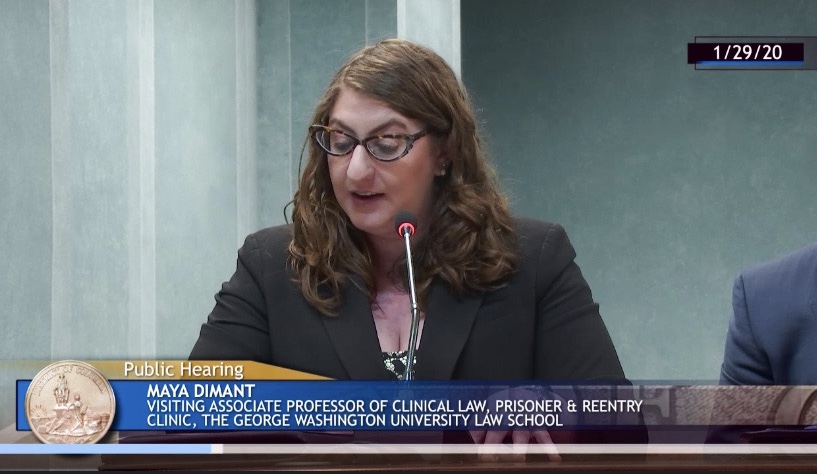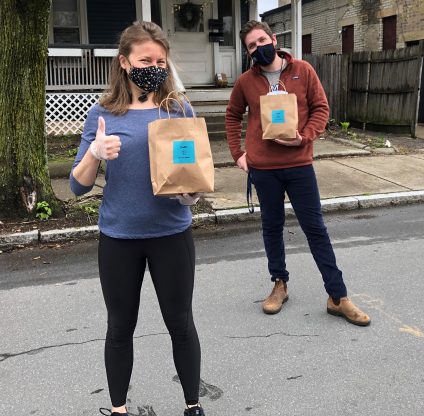Alumni Spurred to Action During COVID-19 Crisis

We hear time and time again that Camp Ramah New England was a life-changing experience for so many. Today we share with you the stories of Simon Luxemburg (Niv ’12, Senior Program Staff/Boston Area Liaison), Maya (Lentz) Dimant (Niv ’01, Rosh Edah) and Jessica Steinberg (Niv ’92, Staff), who are no exception. Simon’s project brings kosher food to Jewish frontline workers in the Boston area, while supporting local small businesses. Maya and Jessica are seeking the compassionate release of prisoners with serious health challenges in the Washington, DC criminal justice system. Their stories are shared below. They feel that their involvement in social justice and action in this time of COVID-19 is deeply rooted in their Ramah experiences, and for these they are extremely grateful. Kol hakavod to Simon, Maya and Jessica for all that they do to make this world a better place.
Every week we look forward to sharing with you stories about Ramahniks who are doing extraordinary in extraordinary times. We have recently given you an insider’s look into the lives of medical professionals, educators, mask-makers, and today, entrepreneurs and legal professionals, who share the single objective of helping those in need. If you or someone you know is doing something extraordinary right now that you would like to share with the Ramah community, please contact Mindy Goldstein.
Simon Luxemburg (Niv ’12, Senior Program Staff/Boston Area Liaison) is a student  in the Hornstein Jewish Professional Leadership Program at Brandeis University. In March, when the coronavirus began to dramatically alter our daily lives, he and his classmates began to brainstorm about how they could best utilize their skills to assist the greater Boston Jewish community during this pandemic. The result was JewBer, a platform that provides opportunities for individuals to celebrate Jewish ritual in their homes and connect to Jewish tradition and community, while supporting their mission to bring hand-delivered meals to Jewish frontline workers (medical, police, firefighter, supply chain, etc.), and at the same time ensuring the future of small local businesses.
in the Hornstein Jewish Professional Leadership Program at Brandeis University. In March, when the coronavirus began to dramatically alter our daily lives, he and his classmates began to brainstorm about how they could best utilize their skills to assist the greater Boston Jewish community during this pandemic. The result was JewBer, a platform that provides opportunities for individuals to celebrate Jewish ritual in their homes and connect to Jewish tradition and community, while supporting their mission to bring hand-delivered meals to Jewish frontline workers (medical, police, firefighter, supply chain, etc.), and at the same time ensuring the future of small local businesses.
While many relief efforts have focused on supporting medical professionals during their long hospital shifts, with Passover quickly approaching, JewBer recognized that these medical professionals did not have the time to shop and prepare for the holiday. Through a coordinated effort with local kosher caterers and organizations, JewBer made sure that these modern-day Jewish heroes could celebrate the freedom of Passover with delicious kosher-for-Passover food.
medical professionals did not have the time to shop and prepare for the holiday. Through a coordinated effort with local kosher caterers and organizations, JewBer made sure that these modern-day Jewish heroes could celebrate the freedom of Passover with delicious kosher-for-Passover food.
JewBer continues to evolve. Now, people can order catered Shabbat meals from community partners through the JewBer platform. For every two Shabbat meals that are purchased, one meal will be donated to a Jewish frontline hero – benefiting both hard-hit kosher establishments and these frontline workers. Simon and his classmates are very pleased with the response to their new business venture, thrilled to be helping the Boston-area Jewish community, and are excited to see what lies ahead for JewBer.
Maya (Lentz) Dimant (Niv ’01, Rosh Edah), a Visiting Associate Professor in the Prisoner & Reentry Clinic at George Washington Law School, and Jessica Steinberg (Niv ’92, Staff), GW Associate Professor of Law and Director of the clinic, recently collaborated to expand the compassionate release program within the Washington, DC, criminal justice system.
Prisoner & Reentry Clinic at George Washington Law School, and Jessica Steinberg (Niv ’92, Staff), GW Associate Professor of Law and Director of the clinic, recently collaborated to expand the compassionate release program within the Washington, DC, criminal justice system.
Compassionate release is a process by which incarcerated people may be eligible for immediate early release because of particularly extraordinary or compelling circumstances that could not reasonably have been foreseen by the court at the time of sentencing. Unlike parole, compassionate release is not based only on a prisoner’s behavior or sentencing but considers medical and humanitarian changes in the prisoner’s situation.
Given how quickly COVID-19 spreads, and the inability to properly enforce CDC guidelines in prisons, Maya and Jessica realized that compassionate release of inmates with compromised health conditions, like diabetes and asthma, was more critical than ever.
Subsequently, they drafted and submitted their policy recommendations to the D.C. City Council. When COVID-19 emergency legislation was passed on April 10, their recommendations were included, and can be found on pages 27-28 of D.C. Act 23-286, with Jessica serving as one of the chief architects of this ground-breaking legislation.
Shortly after the law was passed, Maya’s motion for the compassionate release of a 69-year old man with a history of bronchitis, hypertension and diabetes was granted. The next day, Maya’s client walked free after 38 years of incarceration.
As a criminal justice advocate, Maya views the compassionate release of inmates in the time of COVID-19 as a human rights issue. Maya continues to seek the compassionate release of other inmates with compromised health.